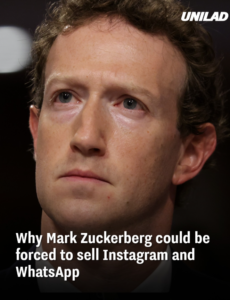Mark Zuckerberg, CEO of Meta Platforms (formerly Facebook), is currently facing a significant antitrust trial that could compel the company to divest its acquisitions of Instagram and WhatsApp. The U.S. Federal Trade Commission (FTC), along with a coalition of state attorneys general, has accused Meta of engaging in anti-competitive practices to maintain its dominance in the social media market.Vox+3MarketWatch+3The Guardian+3
The Core Allegations
The FTC’s lawsuit centers on Meta’s acquisitions of Instagram in 2012 and WhatsApp in 2014. The agency alleges that these purchases were strategic moves to eliminate potential competitors, thereby preserving Facebook’s monopoly power. Internal communications have surfaced, including a 2012 email from Zuckerberg stating that acquiring Instagram could “neutralize a potential competitor” . Such evidence supports the FTC’s claim that Meta employed a “buy or bury” strategy to suppress competition.Business Insider+1New York Post+1The Guardian+6Latest news & breaking headlines+6New York Post+6
Meta’s Defense
In response, Meta argues that its acquisitions were legally approved at the time and have since benefited consumers by enhancing the platforms’ features and user experiences. Zuckerberg contends that the social media landscape remains competitive, citing platforms like TikTok and YouTube as significant rivals . Meta also emphasizes that its services are free and have expanded user access, challenging the notion that it holds a monopoly.The Guardian+2New York Post+2Business Insider+2The Guardian+3MarketWatch+3Business Insider+3
Potential Consequences
Should the court rule in favor of the FTC, Meta could be forced to divest Instagram and WhatsApp, fundamentally altering the company’s structure and market influence. Instagram alone accounts for a substantial portion of Meta’s advertising revenue, and losing these platforms could diminish its dominance in the social media sector . The trial, overseen by U.S. District Judge James Boasberg, is expected to continue into mid-2025, with testimonies from key figures including former COO Sheryl Sandberg and Instagram co-founder Kevin Systrom.The Verge+7The Guardian+7Business Insider+7The Guardian+3New York Post+3Latest news & breaking headlines+3
Broader Implications
This case represents a pivotal moment in the regulation of Big Tech, highlighting the challenges of addressing anti-competitive behavior in rapidly evolving digital markets. A decision to break up Meta could set a precedent for future antitrust actions against other tech giants, potentially reshaping the industry’s landscape and promoting increased competition and innovation
